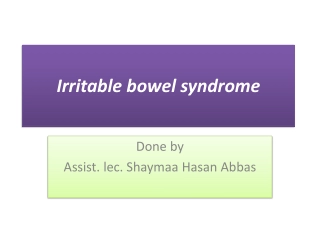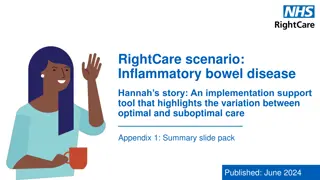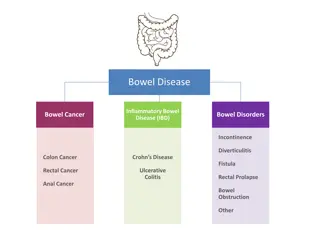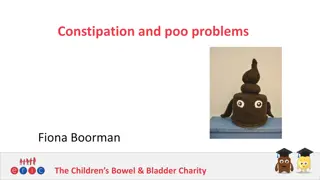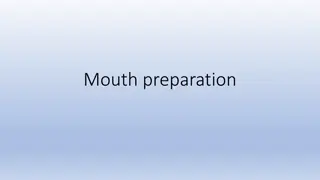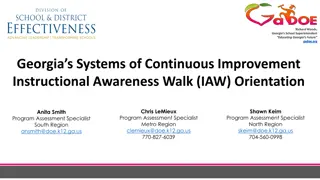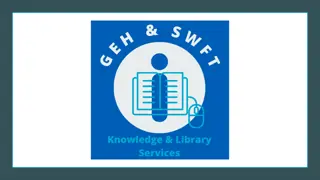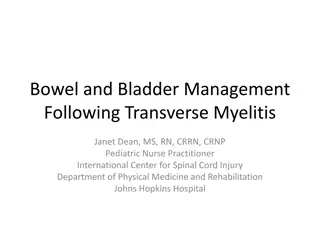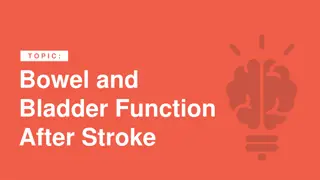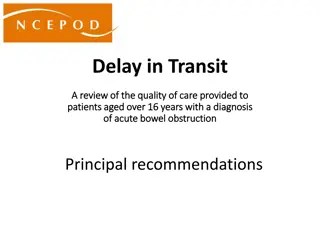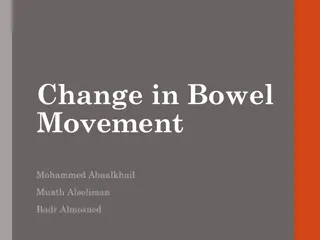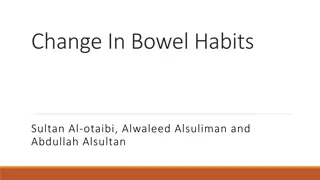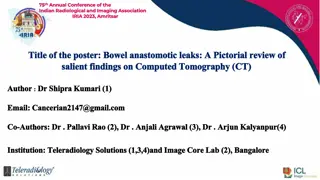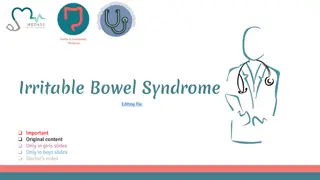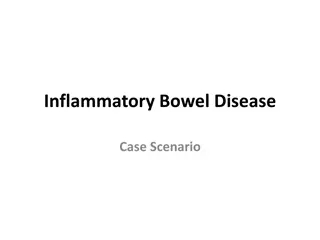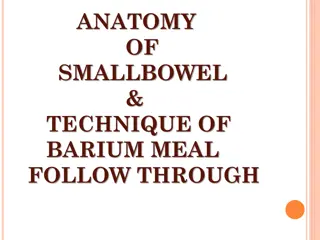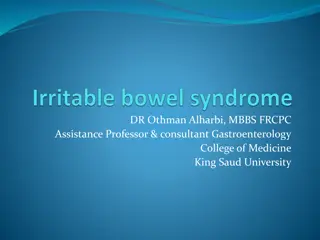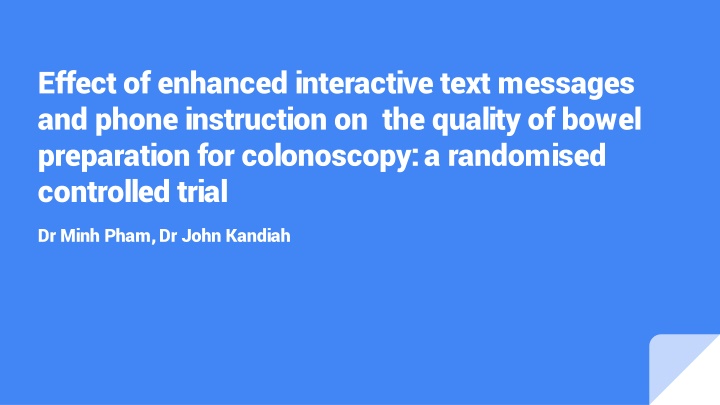
Effect of Enhanced Instruction on Bowel Preparation Quality
Patient comprehension and adherence to bowel preparation instructions are essential for successful colonoscopy outcomes. This study evaluates the efficacy of reinforced instructions using interactive SMS and phone calls leading up to the procedure, aiming to improve bowel preparation quality assessed through the Boston Bowel Preparation Scale (BBPS). Discover the impact of enhanced interactive communication on enhancing colonoscopy preparation quality.
Download Presentation

Please find below an Image/Link to download the presentation.
The content on the website is provided AS IS for your information and personal use only. It may not be sold, licensed, or shared on other websites without obtaining consent from the author. If you encounter any issues during the download, it is possible that the publisher has removed the file from their server.
You are allowed to download the files provided on this website for personal or commercial use, subject to the condition that they are used lawfully. All files are the property of their respective owners.
The content on the website is provided AS IS for your information and personal use only. It may not be sold, licensed, or shared on other websites without obtaining consent from the author.
E N D
Presentation Transcript
Effect of enhanced interactive text messages and phone instruction on the quality of bowel preparation for colonoscopy: a randomised controlled trial Dr Minh Pham, Dr John Kandiah
Introduction Patient understanding of bowel preparation (BP) instruction and compliance is crucial in obtaining good bowel preparation, which impacts the safety and accuracy of colonoscopy. A method of achieving this is by reinforcing this instruction with timed interactive SMS and phone calls in the 48 hours before colonoscopy, through an automated computer program which requires little clinical input. This study aims to evaluate the efficacy of said enhanced instruction by using a validated bowel preparation assessment, the Boston Bowel Preparation Scale (BBPS).
Background Quality of bowel preparation is key to achieving an adequate colonoscopy. Inadequate bowel preparation may lead to1,2: Cancellation on day of procedure Increase the risk of perforation, bleeding or abdominal pain Lengthen procedural time Lower caecal intubation and adenoma detection rates Inadequate BP has been reported in up to 25% of all colonoscopies.3,4 Multiple RCTs have demonstrated that enhanced BP instruction improved the quality of BP. 5
Authors Year Country Method Spiegel et al 6 2011 USA Educational booklet with pictures and FAQs at sixth grade language level Calderwood et.al 7 2011 USA Card with photographs and explanation of good and poor BP Liu et al 8 2012 China Patients called 9-11am day prior reinforcing instruction Lee et al 9 2015 Korea Patients either called or SMS 2 days prior - SMS found to be optimal modality Kang et al 10 2015 China Social media (WeChat) used as platform for both delivering instruction and having Q&A with researcher prior to procedure Janahiraman et al 11 2020 Malaysia Additional 20 minute education session on day of booking colonoscopy Walter et al 12 2021 Germany Installed smartphone app which provided instructions and time adjusted push notifications for timing of diet and preparation mixture Enhanced BP Instruction Studies
Reason for SMS and Phone Calls Previous studies had used a range of methods in order to enhance bowel preparation instructions. In each study, there had been limitations found with each method -either too labour intensive (ie 20 minute education sessions or phone calls) or were too technological for all patients to participate (ie social media platforms or smartphone apps). It was thought that a combination of SMS and phone calls, done by automated software was the best combination of the two methods of enhanced instruction, by having all patients being able to access the enhanced instruction, while at the same time not being labour intensive for investigators.
Objectives Primary objective is to study the effect of enhanced instruction on bowel preparation quality, cancellation rate, complication rate, caecal intubation rate and polyp detection rate. Secondary objective is to assess the patient s understanding of and compliance with the routine bowel preparation instruction.
Study Design All patients booked for a colonoscopy at Griffith Base Hospital are invited to participate in the trial. After full informed consent, these patients are added to a computer program written specifically for this study -Enhanced Interactive SMS and Phone Instruction for Bowel Preparation (EiSIP). This consent is attached to the patient s RFA. Once patients are consented, they are added to the booking list on EMR for colonoscopy. This list is automatically uploaded to the program, which takes the name and mobilse phone number of the patients on the waitlist. Patients who refused the study are removed by the bookings clerk. This program automatically and silently randomises all patients included in the study to either receive or not receive the enhanced interactive instructions via SMS and phone calls.
Study Design Once randomised, those who are randomised to receive enhanced instructions receive a series of 5 text messages. No Time Reason 1 8am 2 days prior Reminder about procedure, link to website, bookings phone number 2 Immediately after 1 Remind patient to commence low fibre diet 3 6pm 2 days prior Start clear fluid diet from midnight 4 8am day prior Reinforce clear fluid diet 5 12pm day prior Reminder for moviprep timing and volume of additional clear fluid
Study Design Patient is asked to reply OK to each message. If no reply after 3 hrs, pre- recorded phone call sent to patient with same message, asking patient to press 1 if they understand. If no response to phone call, investigators notified about potential problem with compliance. Response only included for first and last message, which also contains website for further information about bowel preparation.
Study Design All patients included in study are also asked to complete a questionnaire when arriving at Day Surgery for their procedure. Questionnaire used to assess understanding and compliance with bowel preparation. Questionnaire is not seen by the proceduralist prior to performing the colonoscopy. Proceduralist then completes a Boston Bowel Preparation Score sheet to assess the bowel preparation at the time of colonoscopy.
Study Design Inclusion/Exclusion Criteria All patients booked for elective colonoscopy Full informed consent given It is hoped that 500 participants will be recruited for both arms of the study. Further information in language has been provided in the two largest non-english speaking populations at Griffith, Italian and Punjabi -all consent information, as well as messages, phone calls and questionnaires have been translated.
Outcome Measures Primary Endpoints 1. Evidence of statistically significant improvement in BBPS scores Secondary Endpoints 1. Evidence of statistically significant reduction in complication and cancellation rate 2. Evidence of statistically significant improvement in caecal intubation and polyp detection rates 3. Evidence of statistically significant improvement in patient s understanding of and compliance with BP instruction
Thank you Further information -griffith.bowelprep.info
References 1. Rex DK, Imperiale TF, Latinovich DR, Bratcher LL. (2002). Impact of bowel preparation on efficiency and cost of colonoscopy. Am J Gastroenterol. 2002 Jul;97(7):1696-700. doi: 10.1111/j.1572- 0241.2002.05827.x. PMID: 12135020. Chokshi RV, Hovis CE, Hollander T, Early DS, Wang JS. (2012). Prevalence of missed adenomas in patients with inadequate bowel preparation on screening colonoscopy. Gastrointest Endosc. 2012 Jun;75(6):1197-203. doi: 10.1016/j.gie.2012.01.005. Epub 2012 Feb 28. PMID: 22381531. Froehlich F, Wietlisbach V, Gonivers JJ, Burnand B, Vader JP. (2005). Impact of colonic cleansing on quality and diagnostic yield of colonoscopy: the European Panel of Appropriateness of Gastrointestinal Endoscopy European multicenter study. Gastrointest Endosc. 2005 Mar;61(3):378-84. doi: 10.1016/s0016-5107(04)02776-2. PMID: 15758907. Harewood GC, Sharma VK, de Garmo P. (2003). Impact of colonoscopy preparation quality on detection of suspected colonic neoplasia. Gastrointest Endosc. 2003 Jul;58(1):76-9. doi: 10.1067/mge.2003.294. PMID: 12838225. 2. 3. 4.
Refences 5. Guo X, Yang Z, Zhao L, Leung F, Luo H, Kang X, Li X, Jia H, Yang S, Tao Q, Pan Y, Guo X. (2017). Enhanced instructions improve the quality of bowel preparation for colonoscopy: a meta-analysis of randomized controlled trials. Gastrointest Endosc. 2017 Jan;85(1):90-97.e6. doi: 10.1016/j.gie.2016.05.012. Epub 2016 May 14. PMID: 27189659. Spiegel, B. M., Talley, J., Shekelle, P., Agarwal, N., Snyder, B., Bolus, R., Kurzbard, N., Chan, M., Ho, A., Kaneshiro, M., Cordasco, K., & Cohen, H. (2011). Development and validation of a novel patient educational booklet to enhance colonoscopy preparation. The American journal of gastroenterology, 106(5), 875 883. https://doi.org/10.1038/ajg.2011.75 Calderwood, A. H., Lai, E. J., Fix, O. K., & Jacobson, B. C. (2011). An endoscopistblinded, randomized, controlled trial of a simple visual aid to improve bowel preparation for screening colonoscopy. Gastrointestinal endoscopy, 73(2), 307 314. https://doi.org/10.1016/j.gie.2010.10.013 6. 7.
References 8. Liu, X., Luo, H., Zhang, L., Leung, F. W., Liu, Z., Wang, X., Huang, R., Hui, N., Wu, K., Fan, D., Pan, Y., & Guo, X. (2014). Telephone-based re-education on the day before colonoscopy improves the quality of bowel preparation and the polyp detection rate: a prospective, colonoscopist-blinded, randomised, controlled study. Gut, 63(1), 125 130. https://doi.org/10.1136/gutjnl-2012-304292 Lee, Y. J., Kim, E. S., Choi, J. H., Lee, K. I., Park, K. S., Cho, K. B., Jang, B. K., Chung, W. J., & Hwang, J. S. (2015). Impact of reinforced education by telephone and short message service on the quality of bowel preparation: a randomized controlled study. Endoscopy, 47(11), 1018 1027. https://doi.org/10.1055/s- 0034-1392406 10. Kang, X., Zhao, L., Leung, F., Luo, H., Wang, L., Wu, J., Guo, X., Wang, X., Zhang, L., Hui, N., Tao, Q., Jia, H., Liu, Z., Chen, Z., Liu, J., Wu, K., Fan, D., Pan, Y., & Guo, X. (2016). Delivery of Instructions via Mobile Social Media App Increases Quality of Bowel Preparation. Clinical gastroenterology and hepatology : the official clinical practice journal of the American Gastroenterological Association, 14(3), 429 435.e3. https://doi.org/10.1016/j.cgh.2015.09.038 9.
References 11. Janahiraman, S., Tay, C. Y., Lee, J. M., Lim, W. L., Khiew, C. H., Ishak, I., Onn, Z. Y., Ibrahim, M. R., & Chew, C. K. (2020). Effect of an intensive patient educational programme on the quality of bowel preparation for colonoscopy: a single-blind randomised controlled trial. BMJ open gastroenterology, 7(1), e000376. https://doi.org/10.1136/bmjgast-2020-000376 12. Walter, B., Frank, R., Ludwig, L., Dikopoulos, N., Mayr, M., Neu, B., Mayer, B., Hann, A., Meier, B., Caca, K., Seufferlein, T., & Meining, A. (2021). Smartphone Application to Reinforce Education Increases High-Quality Preparation for Colorectal Cancer Screening Colonoscopies in a Randomized Trial. Clinical gastroenterology and hepatology : the official clinical practice journal of the American Gastroenterological Association, 19(2), 331 338.e5. https://doi.org/10.1016/j.cgh.2020.03.051

